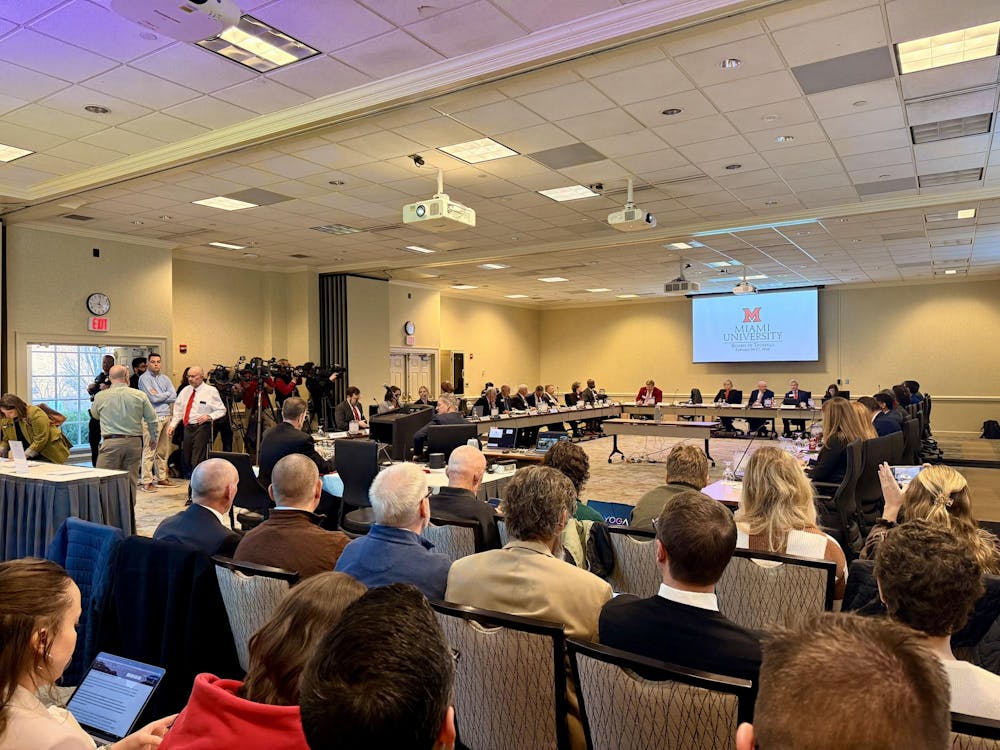The Talawanda School District Board of Education continued discussing potential changes for the busing system and school start times for the 2024-2025 school year at its April 11 meeting.
Discussion around the change first began at the March 21 meeting, when the board explained that superintendent Ed Theroux would officially decide next year’s school schedule and bus routes. However, the school board does have the ability to vote on the financial implications of the decision.
The board has predicted that an additional $1 million will be required to instill a two-tiered busing system for next school year. Not only would there be additional costs associated with a two-tiered system, but it would also require school start times to shift.
As discussed at the previous meeting, changing the busing system to provide transportation services for elementary and middle school students within a one-mile radius and all high school students would require the elementary schools to start at 7:15 a.m., while Talawanda middle and high school would start at 8:40 a.m. and 8:45 a.m., respectively.
This model allows the district to share buses between the schools and make transportation services more accessible. However, community members did express concerns about elementary school students needing to wake up much earlier than they currently do.
Brooke Cropenbaker, a developmental psychologist and mother to a rising kindergartener, was one of a few participants who spoke on the benefits of a later start time for elementary-aged children.
“Research shows that our youngest children need 12 to 13 hours of sleep per night,” Cropenbaker said. “Data has shown in our district that the 8 a.m. start time has led to better educational and attendance outcomes.”
The conversation then shifted to school board member David Bothast, who led the discussion during the April 11 meeting. Bothast stated that though he initially thought the current system was not ideal, his opinion has since changed.
“While I wasn’t originally a proponent of one-tiered busing when it was first presented last year, I was pretty impressed with how the community stepped up and responded to it because we had to,” Bothast said. “We made it work.”
Bothast also touched on how parents have already changed their schedules once to accommodate the current system.
“I also don’t think we honor the sacrifices of parents by making them shift their schedules again this summer,” Bothast said.
As a result of his concerns, Bothast introduced a new motion to keep the current one-tier busing system in place for the following school year. School Board Member Pat Meade also expressed his support, while new member Dawn King stated that the vote may be premature.
Enjoy what you're reading?
Signup for our newsletter
“I just don’t think it’s fair to our families to take a vote this quickly on something this big,” King said.
The board voted on maintaining the current busing system for the following school year, with a suggestion from School Board President Rebecca Howard to fail the motion and table the conversation for next month’s meeting.
The vote failed, with two yes votes from Bothast and Meade and three no votes from King, Howard and Chris Otto. The board will revisit the conversation during its May meeting.
Although the decision remains in Theroux’s hands, if the board chooses to pass a motion declining the allocation of an additional $1 million towards busing, Theroux would be unable to change the model.
The district is developing a survey to get community feedback on the issue, which will be posted on E-news and the district’s website.
The survey will allow families to express support for one of three models for next school year: keeping the current one-tier busing system, changing to a two-tier system and earlier start times for elementary students or reverting to a previous model from two years ago with later start times for elementary students, and earlier start times for middle and high school students.
“There is no perfect solution to this problem,” Theroux said, “and I want to be clear about that.”
The next school board meeting will be on May 16 at 7 p.m. in the Talawanda High School auditorium. An online option is also available via the board’s website. The board is expected to continue discussing and potentially vote on the busing model during the meeting.




